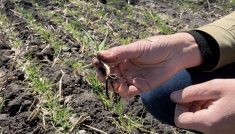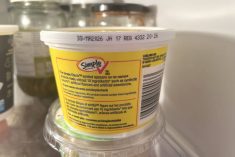Correction:Due to an editing mistake, an opinion piece from Lydia Johnson which appeared in the Aug. 11 issue, contains the erroneous statement: “They did this fully knowing that they were going to ‘stuff’ this water into the already overcapacitated Lake Manitoba, which does have a proper outlet drain for the extra diverted waters to go in order to reach Lake Winnipeg.” The statement should have read: “the already overcapacitated Lake Manitoba, which does not have a proper outlet drain for the extra diverted waters to go in order to reach Lake Winnipeg.
Read Also

Tie vote derails canola tariff compensation resolution at MCGA
Manitoba Canola Growers Association members were split on whether to push Ottawa for compensation for losses due to Chinese tariffs.
Open for business:After
years of effort by industry and government, Vietnam’s Department of Animal Health has now formally approved the Canadian export health certificates for live cattle and live goat and sheep, allowing trade to resume immediately, the federal government has announced. Canadian exporters can find the required documentation on the Canadian Food Inspection Agency (CFIA) website at www.inspection.gc.ca.
The new market is worth up to $50 million and will lead to the first commercially significant sales of these Canadian animals into Asia since 2003. – Staff
Obama biofuel boost:
The Obama administration has announced a $510-million matching-investment initiative to boost the production of next-generation biofuels in the U.S.
“The president understands that for us to be more competitive economically and for us to be more secure, we need a diversification in our energy choices rather than continuing to blindly support oil-producing monopolies,” Secretary of Agriculture Tom Vilsack said.
Projects would involve producing fuels from wood chips and inedible parts of plants, as opposed to those made from corn.
Man-made famine:The famine
in the Horn of Africa is man made – the result of artificially high prices for food and civil conflict, the World Bank’s lead economist for Kenya, Wolfgang Fengler told Reuters Aug. 16. “Droughts have occurred over and again, but you need bad policy making for that to lead to a famine,” Fengler said.
Some 12.4 million people in the Horn of Africa – including Somalia, Kenya, Ethiopia and Djibouti – are affected. Fengler said the price of maize, or corn, was significantly higher in east Africa due to controls on local food markets.
Three-year high:Global food
prices held near three-year highs in July and stocks were low, piling on pressure on the world’s poor, the World Bank says.
The World Bank Food Price index increased 33 per cent in July from a year ago and stayed close to 2008 peak levels, with large rises in the prices for maize, or corn, and sugar. “Persistently high food prices and low food stocks indicate that we’re still in the danger zone, with the most vulnerable people the least able to cope,” said World Bank president Robert Zoellick.
Flax fuels firepits:The
Carman-based Flax Power has received more than $87,000 through the Agri- Opportunities Program. The funds will help increase its production capacity, including the purchase and installation of new production equipment that will bring its “PowerLog,” an innovative fire log made of flax, to the marketplace.
The company developed a technique that can densely pack flax shives, small pieces of the stem of the flax plant, into an all-natural environmentally friendly, long-burning fire log. – Staff
More of the same:Kansas
farmer Larry Kepley is almost out of hope. After drought left the veteran wheat farmer with what he called the “worst wheat harvest” he’s ever known, the odds for next year’s crop are looking just as grim. Sun-baked fields are as hard as rock, and moisture levels deep into the soil are nearly non-existent as drought persists throughout much of the U.S. southern Plains.
“We’re always saying next year it will be better, but it doesn’t look very hopeful at this point,” said Kepley, who grows wheat in the far southwestern part of Kansas.
Kids welcome:Elections
Manitoba is trying to get more young people to vote. A new campaign encourages parents to involve their children in the Oct. 4 election, through a number of fun activities they can find by visiting the website, CitizenNext.ca. Children will be welcomed at advance and election day voting places where they will receive a “Future Voter” sticker.
“By speaking directly to children and their parents, we hope to engage more people to participate in this election,” said Elections Manitoba official Mary Skanderbeg.
– Staff Correction:A story on page 17 in the August 18 issue, contains a mistake in the headline. Instead of saying “Early winter weed seeding” the headline should have said “Early winter wheat seeding.” – Staff














